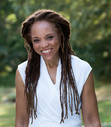Sophfronia Scott's Blog: Sophfronia Scott, Author, page 26
October 4, 2017
Essence Magazine: Unforgivable Love a “sumptuous new tale”
Unforgivable Love is featured in the October 2017 issue of Essence Magazine. Reviewer Patrick Henry Bass called the book a “delicious and infinitely enjoyable read.”
The full review is available at this link on the Essence website.
September 7, 2017
Unforgivable Love an Anticipated Historical Fiction Release
UNFORGIVABLE LOVE is listed in the BookBub Blog’s round up of “the biggest new historical fiction releases coming out this fall” along with books by Heather Webb, Elise Hooper, Devin Murphy, Alice McDermott, Jennifer Egan, and Janet Fitch.
Read the complete list here.
From the BookBub website: BookBub is a free daily email that notifies you about deep discounts on acclaimed ebooks. You choose the types you’d like to get notified about — with categories ranging from mysteries to cookbooks — and we send great deals in those genres to your inbox.
BookBub doesn’t actually sell books. We simply alert you by email to fantastic limited-time offers that become available on retailers like Amazon’s Kindle store, Barnes & Noble’s Nook store, Apple’s iBooks, and others. Book publishers offer deals at these sites for promotional purposes, and our staff works with them to determine the best ones to feature to our members.
BookBub features ebooks ranging from top-tier publishers to critically acclaimed independent authors. Our team of experts makes sure that we’re only featuring great deals on quality books that you’ll love.
August 24, 2017
Curating the Awst Press Anniversary Essay Series
Recently I had the honor of being asked by Awst Press to curate, along with the author Susanna Childress, its annual essay series. Awst is an independent literary publisher located in Austin, TX. Awst is Welsh for August, the month in which the press was founded, and the essay series takes place each August to celebrate the press’s anniversary. Last year I had the pleasure of contributing an essay, “Of Flesh and Spirit,” to a series with the theme of “Outsiders.”
This year’s theme is similarly thought-provoking and important: Religion. Here are the thoughts Susanna and I posted this week on our topic:
https://awst-press.com/essay-series/thoughts-from-our-2017-essay-series-curators
It’s been great taking on the subject of religion and spending the past few months recruiting writers and working with them on their essays. Over the next month we’re featuring the writing of Ayesha Ali, A. Anupama, Sarah Faulman Arthur, Eman Beshtawii, Alicia Jo Rabins, Allison Schuette, Michelle Webster-Hein, and Sarah Wells. Their essays are amazing. I hope you’ll follow the series and catch them all.
Here’s the first essay, “The Lord’s Name,” from the excellent Sarah Wells. I love that she invokes the late Brian Doyle. The Annie Lennox quote is pretty cool too!
Enjoy the journey.
July 26, 2017
Kirkus Review of Unforgivable Love
Kirkus calls Unforgivable Love “a dazzlingly dark and engaging tale full of heartbreak, treachery, and surprise.” Kirkus critics also list the novel as similar to A Hundred Summers by Beatriz Williams and The Bonfire of the Vanities by Tom Wolfe.
July 5, 2017
The Music of Unforgivable Love
This lazy summer day, for me, brings to mind a moment in my novel Unforgivable Love when Val Jackson, enjoying after-dinner cocktails with Elizabeth Townsend and his Aunt Rose, puts on a record he’s purchased for his aunt. It’s a new song by Ella Fitzgerald called “A Sunday Kind of Love” and Val is using it as an opening move in the hot weather game he’s just begun.
When I embarked on the adventure of creating Unforgivable Love, I knew I wanted to write a story where money obviously wasn’t an issue, and to have it take place in settings I wanted to spend time in: lush gardens, large gorgeous rooms filled with sumptuous jazz music. I liked having the sounds of Duke Ellington, Louis Jordan, and Ella Fitzgerald flowing through the book’s pages. I wanted to relate a vision of elegance, of well-dressed people strolling down the street or through a park. In the coming weeks as we near the publication of the novel I will introduce you to the elements that served as both inspiration and the building blocks that make up the world of Unforgivable Love. When you have the book in your hands come September, I hope you’ll feel as at home as I did during the time I spent with the characters who live there.
Let’s start with the music.
When you listen to this music you’ll soon notice I favor a lush jazz sound, full of bright trumpets and sexy, intoxicating saxophones. I consider it the baseline soundtrack of the book, the music running like an underground spring through my mind as I wrote. As noted, some of these songs appear in the book and have direct story implications. Others served as pure inspiration and a few are songs favored by my characters based on influences on them.
I’m curious to hear your thoughts after listening to the playlist. Feel free to come back to this page and comment. I’m happy to make additions to the list if you feel there’s a piece that absolutely has to be here. Have fun with it. Enjoy!
A Sunday Kind of Love, Ella Fitzgerald (as referenced above.)
Nature Boy, Nat King Cole (A song sung by the character of Sam in a nightclub scene.)
Lady of the Lavender Mist, Duke Ellington (Mae Malveaux’s signature song at the nightclub.)
Let the Good Times Roll, Louis Jordan (One of the songs played outdoors at Aunt Rose’s during an event.)
Azure Te, Louis Jordan (This song isn’t in the book, but it served as inspiration for the novel’s scenes in Paris.)
As Long As I Live, Lena Horne (Elizabeth finds herself humming this song.)
Take the “A” Train, Duke Ellington (This and the following tunes by Ellington, Monk, Davis, and Parker, are indicative of the music of the time. To me it’s playing somewhere even if not directly mentioned.)
I’m Just a Lucky So and So, Duke Ellington
I’m Afraid (Of Loving You Too Much), Duke Ellington
Satin Doll, Duke Ellington
‘Round Midnight, Thelonius Monk
Donna Lee, Charlie Parker and Miles Davis
Scrapple from the Apple, Charlie Parker
Confirmation, Charlie Parker
Zouzou: C’est lui, Josephine Baker (The younger Mae Malveaux is a fan of Baker so here are a couple of songs Mae would have listened to, possibly with her friend Alice.
Jai deux amours, Josephine Baker
Boo-Wah Boo-Wah, Cab Calloway (The tune being played by the jazz band in the Parisian club Tabou when Mae visits with a conquest.)
June 24, 2017
Book Review: Hunger-A Memoir of (My) Body by Roxane Gay
“I don’t know how I let things get so out of control, but I do.” These words, repeated a few times in Roxane Gay’s memoir, hold the tension of this important work. The tension is the push and pull between strength and vulnerability, courage and fear, reality and illusion, knowledge and confusion. This tension is where the author lives. “…here is my heart, what’s left of it. Here I am showing you the ferocity of my hunger.” I admire this stance. I like how Gay, in a world that adores happy endings and experiences neatly dissected for meaning, “went there,” showing the pain and frustrations she continues to endure. She isn’t afraid to admit the story is ongoing. But hope is present in her life, in tiny glowing balls that remind her she is not totally in darkness: she is loved, her work is affecting lives, she is seeking the geographic place her heart most wants to call “home.” For this reason, the fact of its clear-eyed and difficult truthfulness, I believe this book will do more for more people than a truckload of all those happy ending books could ever do. Gay says this was a hard book to write. I am glad she managed to do it.
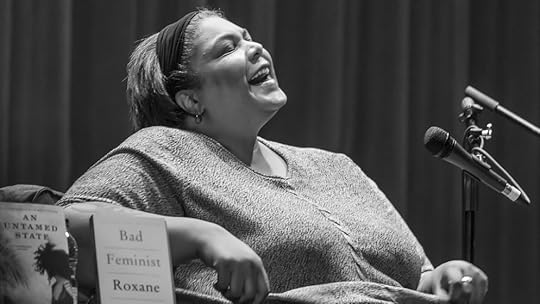
Photo by Eva Blue
June 15, 2017
The Intentional Writer: Diana Butler Bass
Diana Butler Bass delivered two insightful keynote addresses at Princeton Theological Seminary recently for the Frederick Buechner Writer’s Workshop. The first, “The Accidental Writer,” described how the author whose latest book is Grounded: Finding God in the World, A Spiritual Revolution, fell into her writing career by way of the academic world and then journalism. “Cherish your own path,” she said. “There is no one path to becoming a writer.”
There’s also no one way of being a writer, but it seems to be an area where many writers or writers-to-be struggle. That’s why successful authors are forever asked questions about their routines and their writing practice. Diana answered all these questions in her second presentation and I found the title quite enlightening: “The Intentional Writer.” In other words, once you decide you’re a writer, you can be intentional about the way you go about your work—to be serious and professional about it. You are intentional about how you learn, how you write, how you connect with people. She described intentionality as “moving from just falling into stuff to paying attention.” In other words, you’re making conscious choices about your writing life.
She shared with us the eleven things she does regularly and with intention that help her be a writer. They are all excellent—in fact I do all these things too!—so I’m pleased to share these habits/practices with you.
1.) Haunt bookstores. Diana said, “If you’re a writer and you don’t go to bookstores, I don’t know what’s the matter with you!” In bookstores you find out:
–what people are reading
–what books are being featured on the racks and tables
–what titles seem to pop, what the popular cover colors are, if there’s a design trend going on
–what’s the cultural conversation going on around books
Diana also suggests befriending booksellers and, when hanging out in bookstores, paying attention to what people are buying. This is your fieldwork as a writer.
Your fieldwork should also including reading The New York Times Book Review, The New York Review of Books, and Publishers Weekly.
This next add is a big one: attend author events! I know this can be difficult if you don’t live in an area that’s a popular book tour stop, but making the trip is worthwhile. You get to make a face-to-face connection with an author and sometimes (this is especially true of events in New York City) that author’s editor and literary agent.
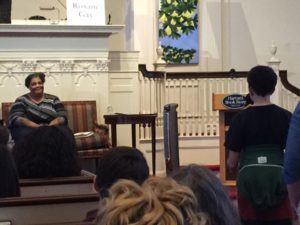 This week I drove over five hours round trip to hear Roxane Gay read and talk about her new book, Hunger: A Memoir of (My) Body. I feel the book is an important work and I wanted to show my support by showing up for one of Roxane’s events. This was the closest one I could attend. I took my 12-year-old son with me and we stood in a line to get in but it was so worth it to hear him whisper to me that he wanted to ask Roxane a question and then, when she was signing his book, see his face light up when she told him she writes comic books. I can’t say it enough: attend author events. Go for the author, go for the bookstore, go for yourself and your writing life.
This week I drove over five hours round trip to hear Roxane Gay read and talk about her new book, Hunger: A Memoir of (My) Body. I feel the book is an important work and I wanted to show my support by showing up for one of Roxane’s events. This was the closest one I could attend. I took my 12-year-old son with me and we stood in a line to get in but it was so worth it to hear him whisper to me that he wanted to ask Roxane a question and then, when she was signing his book, see his face light up when she told him she writes comic books. I can’t say it enough: attend author events. Go for the author, go for the bookstore, go for yourself and your writing life.
2.) Read books! Diana notes the importance of being committed to your own reading. Again, I agree. As writers we must know what’s being written, what’s challenging, what’s good. We must read so that, as the poet Jane Kenyon said, “you have good sentences in your ears.” It’s vital to your work. I use Goodreads to curate my reading and I have a regular goal of reading 40 books a year.
3.) Write daily. I know this isn’t possible for everyone, but Diana counts a lot of things as writing. Even posting on Twitter is writing. “If you can post five amazing tweets, you’re writing,” she said. “It’s like writing poetry.” She also journals. “I’m paying attention to my own spiritual life and to what the world needs.” Find your own way of writing every day. “There’s all kinds of ways to put pen to paper or fingers to computer keys,” Diana said. When you can’t write, she said, do something creative. She colors in coloring books. “Sometimes it’s easier to just take the pencil and color in someone else’s lines,” she said.
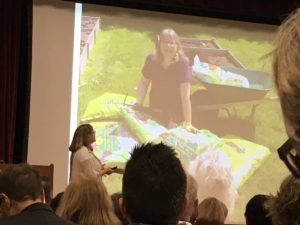
Photo by Barbara Figge Fox
4.) Get out and move. Walk, exercise.
5.) Talk to strangers. Be connected to the world. You’ll never know whom you’ll meet or what you’ll learn.
6.) Instead of asking what a writer is writing, ask them what they’re reading. I loved this suggestion. So many writers don’t like discussing work in progress, especially if it’s very new. But talking about books is so much fun.
7.) Pay attention to your own voice. Diana likes to think about “How can I be Diana in this conversation?” I think this is a helpful question when embarking on a piece about a topic very much in the social conversation such as a tragedy or political event.
8.) Make time for silence, prayer, and meditation. Yes, yes, yes.
9.) Do what you write about. You don’t have to do it perfectly, Diana said, but you do want hands-on experience so you can have authority.

Photo by Mihee Kim-Kort
10.) Make friends with other writers and people who do what you do in the world. Social media is a great way of doing this, and so is attending author events.
11.) Make friends with your audience. Diana said, “The real honor of writing is when someone reads it. It fills me with gratitude, makes me want to respond, to try to care about what my audience cares about.” She knows this isn’t always easy
Diana finished with these thoughts: “Always remember your words will go somewhere and connect to the lives of people you don’t know. Take tender care with this. That’s where the magic happens.”
I loved meeting Diana and I’m looking forward to our growing friendship.

Visual notes by Beth Nyland
June 7, 2017
Words on Writing from Anne Lamott
Anne Lamott delivered the keynote address for the opening of the Frederick Buechner Writer’s Workshop at Princeton Theological Seminary. It’s my second year leading sessions at this powerful event and I was thrilled to learn Ms. Lamott would be here. I arrived at Miller Chapel extra early to grab a good seat.
During the Q&A I was able to ask the author of Bird by Bird how she decides what to write about in today’s tumultuous political climate—does she write what’s on her heart or does she feel impelled to address issues directly? I liked her answer, at least what she could share—she noted she could write for hours on this question. But the abridged version is simply this: you try to write what helps. People need to laugh, she said. What can she write to help people laugh?
She made us laugh during her talk. She was warm and funny and she spoke about writing in a calm, clear, smart way that I’m sure was comforting and helpful for just about every writer in the room. I especially liked hearing her talk about teaching Sunday school at her church.
Here are some of her words that I scribbled down while I listened. I hope you enjoy them. By the way, her latest book is Hallelujah Anyway: Rediscovering Mercy. I now have an autographed copy and I’m looking forward to reading it.
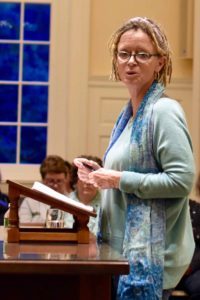
photo by John P. Leggett
From Anne Lamott:
I love the sound of paper, I love the smell of paper…paper was my salvation. When I have my nose in a book I can breathe again.
On writing and getting started: The first thing you do is you stop not doing it. The best thing on earth that can happen is to stop not doing it.
Writing is an act of faith. You just do it. Butt in chair. More will be revealed.
There’s no such thing as “as soon as…” You do it as a debt of honor. There’s never a good time to write.
Writing is painting with words.
In writing we’re trying to capture our deepest truths that might be meaningful for others to hear.
You’re never going to be in the mood and you’re not going to have self-esteem.
You should be writing that which you love to come upon, the thing that makes the inner you go “Ooh! Ooh!”
“I’m really good at 5 or 6 things. And I’m hilariously incompetent at everything else.”
“You don’t want to find yourself at 78 asking, ‘Why wasn’t I outside every day looking up?'”
From Sophfronia: Here’s to being outside as much as possible. Here’s to looking up at the sky.
May 25, 2017
Inspired by Louis Jordan
I knew Louis Jordan’s music long before I knew his name. My daddy loved B.B. King so I grew up listening to B.B. King and one of my favorite songs he sung was “Caldonia.” I think I liked how Caldonia is pretty close to rhyming with Sophfronia! Anyway, in the early 1990s a show called “Five Guys Named Moe” premiered on Broadway featuring the music of Louis Jordan. For me, it was love at first show.
I recognized so many of the songs—“Let the Good Times Roll” and “Don’t Let the Sun Catch You Crying” and, to my surprise, “Caldonia.” The energy of the show was positively contagious. Would I get up and dance when the Guys asked us to? You bet! I saw the show three times on Broadway and once in London. Of course I own the cast recording and I still smile and want to dance and sing out loud whenever I hear it.
As I wrote my novel Unforgivable Love, set in Harlem in the 1940s, Louis Jordan’s music was on my mind as part of the soundtrack of my character’s lives. When Val Jackson is playing baseball, the game he adores, with his friends on his aunt’s lawn I heard “Let the Good Times Roll” playing on a record in the background. When I wrote about Mae Malveaux’s desire to sweep a guy off his feet and take him to Paris I heard “Azure Te.”
I hope you too will have this music in your ears as you read Unforgivable Love when it’s published in September. I’ll share with you here video of Jordan himself as well a few of my favorite songs from “Five Guys Named Moe.” Enjoy the energy and the fun.
May 19, 2017
Book Review: Living in the Weather of the World by Richard Bausch
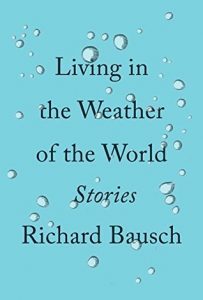 This book made me reconsider the word “story”—not the definition of story but our experience of story in its ages-old form before it had the word “short” in front of it; before it was bound in hardcover and made eligible for awards. Before all that there was someone talking and someone, often many someones, listening. And what they heard caused them to utter the equivalent of “Oh God.”
This book made me reconsider the word “story”—not the definition of story but our experience of story in its ages-old form before it had the word “short” in front of it; before it was bound in hardcover and made eligible for awards. Before all that there was someone talking and someone, often many someones, listening. And what they heard caused them to utter the equivalent of “Oh God.”
This still happens today. We tell stories in bars, in beauty shops, on tennis courts, on buses. A hand flies to the mouth or fingers lightly touch the base of the throat and the same utterance occurs: “Oh God.”
Richard Bausch is a master storyteller—a description/phrase that gets thrown around a lot but is pin-point accurate for him. He deftly strips a narrative down to the essence of story so in reading his work, finely represented in this new collection, you want to read it fast because you’re so engaged you can’t wait to learn what happens next. The characters are enduring the shifting, unpredictable weather of emotions and drama that befalls all of us. The hook for each piece could easily be the topic of eager discussion at a backyard barbecue, a girls night out, or while waiting in line for movie tickets.
Did you hear about that poor guy who went to mug someone and his victim turned out to be an off-duty cop?
Hey, they brought Freddie into the emergency room. His wife thought he was at the movies with his brother.
That guy at the museum? Isn’t he the one who ran over that kid?
My mom tried online dating and it ended in tears—but not hers!
See her? Her fiancé dumped her and she knocked him out cold.
Forget about Bausch’s accolades and long literary history. Read these stories because they’re great stories. Read them and pretend you’re with a friend, or out with the guys or gals trading tales. Only you’re really in the privacy of your own head, listening to Bausch. How long before you utter “Oh God”?
My guess? Not long.
Enjoy the book.

